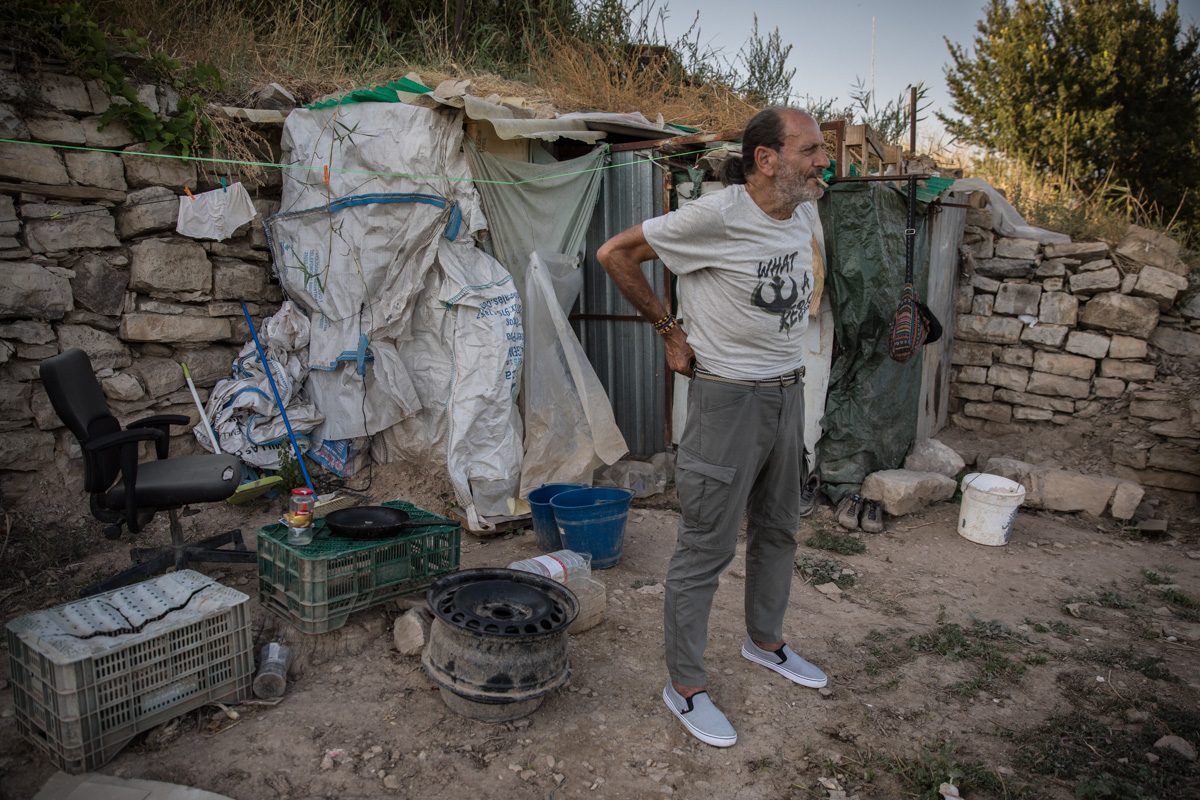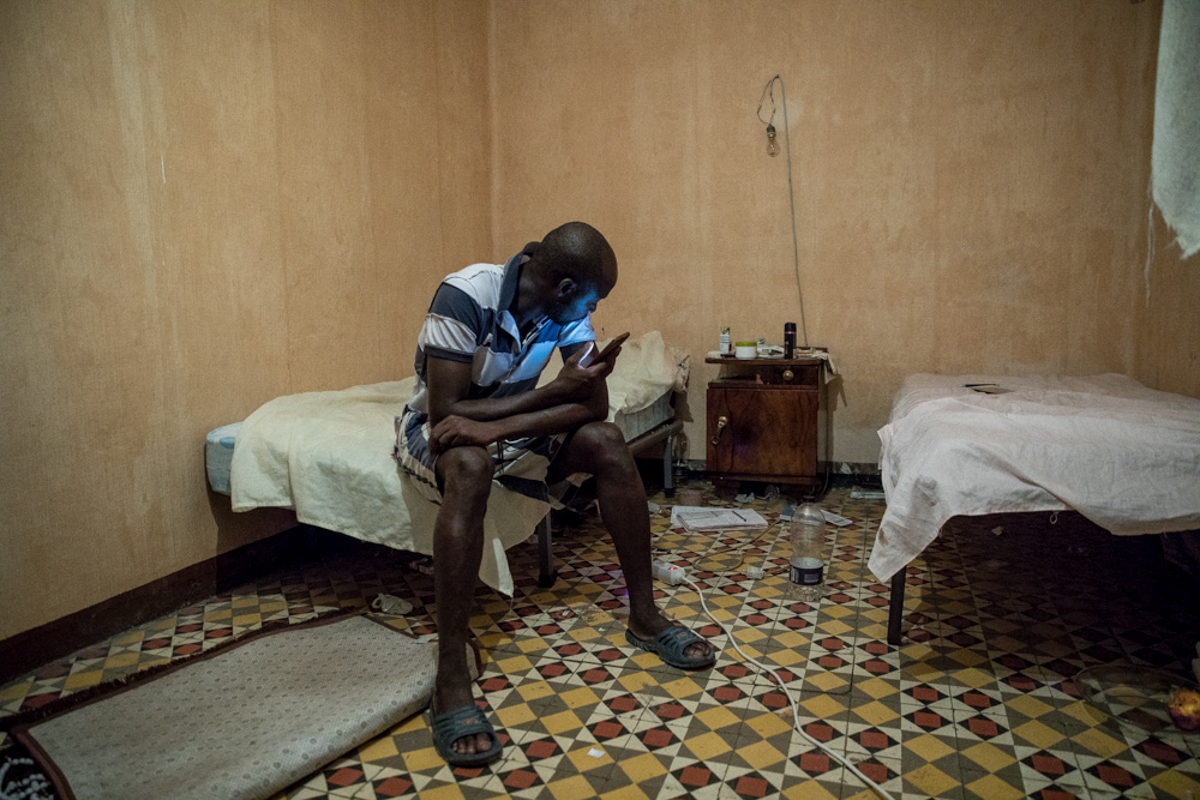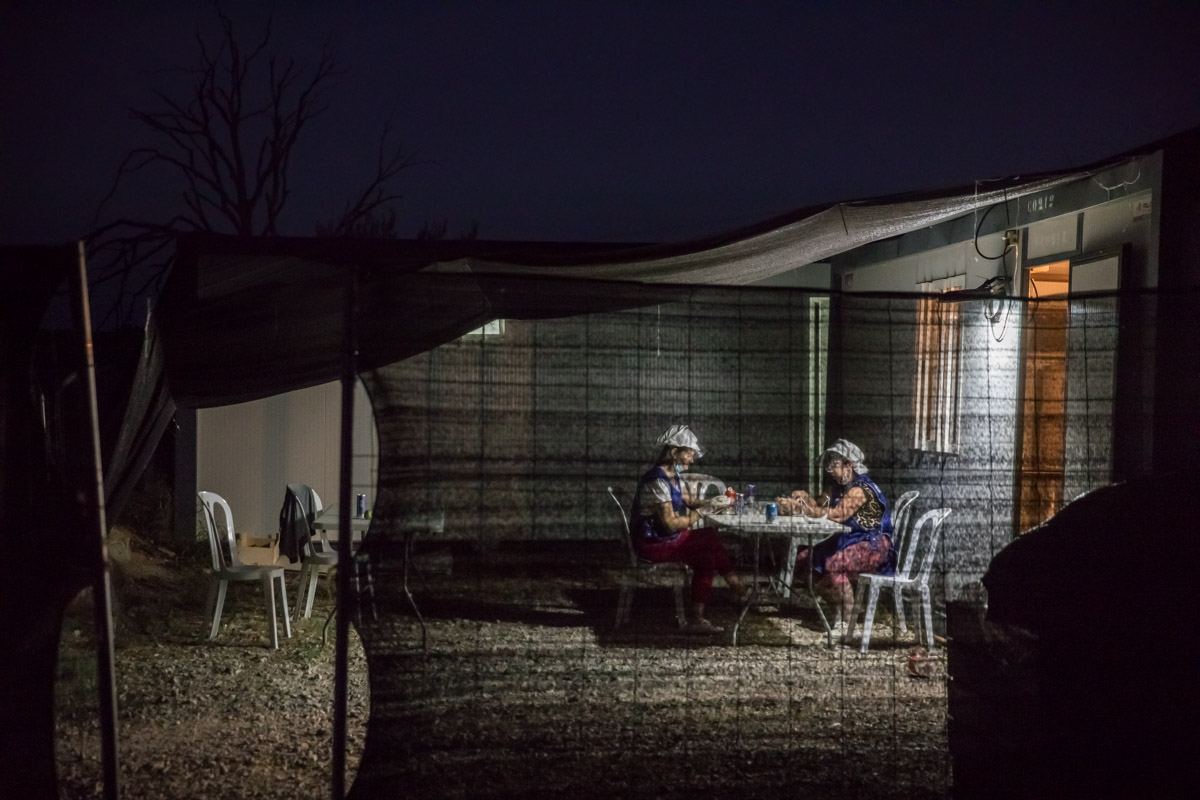
15 Sep Migrar al Segrià por un jornal
Manuel se acicala temprano con la intención de buscar trabajo como jornalero un día más. Ha dormido en un colchón a la intemperie pues en la pequeña barraca que su colega Mohamed construyó para pasar inadvertida no caben los dos. Desde su parcela se avistan humaredas en los campos frutales de Aitona cercanos al río Segre a las 7 de la mañana. Dos familias rumanas emparentadas se protegen quemando citronela para ahuyentar a los mosquitos, en su décimo año recolectando fruta. En la vecina Torres de Segre, Thiam se ajusta una redecilla por encima de la gorra y la mascarilla. Reconocido como refugiado hace dos años, comenzó a trabajar en 2019 gracias a la recomendación de un paisano. Él es la excepción entre sus compañeros, temporeros veteranos del Segrià entre 7 y 10 años.
La campaña del 2020 viene marcada por la pandemia. El Segrià se da a conocer en el mundo por los rebrotes del virus. La alarma social se expande. El 12 de julio se decreta confinamiento total en la ciudad de Lleida y en 7 poblaciones de la comarca, permitiendo únicamente el libre movimiento para aquellos que forzosamente tengan que trabajar fuera. El fantasma del contagio del Covid-19 está demasiado presente.
El llamamiento que hizo la Unió de Pagesos en el mes de abril ha atraído a personas de toda condición del Estado Español. Manuel, de nacionalidad española, decidió abandonar a finales de abril el pabellón de la Fira de Montjuic en Barcelona, habilitado por la pandemia para acoger a las personas sin hogar. Durante semanas visita todas las empresas frutícolas en la zona de Serós, Soses y Aitona. Recibe una oferta de contratación a partir de julio, pero todo se queda finalmente en tres jornadas esporádicas. Su colega Mohamed, también de la Fira, tiene más suerte. La experiencia previa como jornalero le ayuda; el permiso de trabajo también. Lo contratan para 4 meses, a 6,3 euros la hora. Sin opción de alojamiento decide construirse una barraca en un lugar oculto cercano a unos campos, que comparte con Manuel durante un tiempo.
La granizada del 16 de junio destroza la fruta de múltiples explotaciones que se ven obligadas a renunciar a la campaña, acudiendo al seguro agrario para poder compensar las pérdidas. Muchos contratos de mano de obra no llegan a prosperar, o se resciden antes de tiempo. Las expectativas marcadas al inicio de la temporada quedan frustradas tanto por la propagación del virus, como por la inesperada tormenta de granizo. Se suma la presión mediática que amenaza las posibilidades de distribución de la fruta recolectada. «Hemos tenido que reetiquetar la fruta con origen Francia, porque el Segrià ahora no vende con tan mala prensa» confiesa un joven payés que prefiere permanecer en el anonimato. «No es la primera vez que se hace» revela otro payés que recuerda que en la reciente crisis con Rusia se llegó a etiquetar la fruta del Segrià con origen Rusia para que alcanzase a dicho país.
Una imagen extraña ofrece la ciudad de Lleida, vacía y silenciosa, confinada a finales de Julio. La excepción se encuentra en la conocida «plaza de los Africanos» en el casco histórico, donde se hacinan día y noche subsaharianos a la espera de un trabajo, aunque sea eventual. «Algunos payeses pasan por aquí a horas determinadas y nos ofrecen trabajo para el día siguiente», comenta el joven Ousmane de 18 años que vino a Lleida desde el País Vasco. No es el único. Alí vino desde Italia en coche. Reconoce aún sorprendido que no tuvo ningún problema para cruzar fronteras por carretera. «Aquí no hay trabajo» comenta Lamine, que duerme todas la noches desde hace dos meses en las proximidades de la plaza. Varios carteles colgados en el balcón de un bloque de pisos reclaman «Silencio! temporeros durmiendo», porque desde el inicio de la temporada decenas de africanos duermen en estas calles. El futbolista del Mónaco Keita Baldé, de origen senegalés, conmovido por la situación de sus compatriotas decidió socorrerlos reabriendo el Casal de Joves cercano que se cerró por el decreto de alarma el 14 de marzo, para ofrecer hasta 200 menús diarios durante 3 meses, entre otras acciones.
Thiam huyó del ignorado conflicto en Casamance, Senegal. Su pueblo hace frontera con esta región, donde un movimiento independentista promueve la separación de Senegal y las incursiones son constantes. Entre los compañeros con los que recolecta a diario, no fue el único que huyó de Senegal. Ngourou era profesor de wolof en su pueblo, además de campesino. En 2005 llega a España en patera. «Arriesgar la vida en el mar para poder salvarla», rememora cuando evoca la gran decisión de su vida. Vive en un piso compartido que le alquila el payés que le contrata por 100 euros mensuales. Son muchos los payeses que ofrecen alojamiento a sus trabajadores, desde pisos compartidos, antiguas casas payesas, barracones, almacenes y casetas… Este año a Abdel, de origen marroquí, le ha tocado vivir en una barraca que comparte con otro compatriota a coste cero. No tiene ni agua ni luz, pero está contento porque trabaja. Es algo excepcional debido a la pandemia. Los años anteriores compartía piso con otros nueve jornaleros pero este año, a fin de preservar cierta distancia en el interior de la vivienda, el payés lo ha reubicado.
El 30 de julio se levanta el confinamiento en Lleida. Manuel, que se había instalado en las inmediaciones de la estación de tren, pernoctando con otro excompañero de la Fira, regresa a Barcelona. Algunos temporeros apuran sus últimos días antes de moverse a otra región, pues varios payeses dan por finalizada la temporada a mitad de agosto. El coronavirus hace tiempo que ha traspasado la frontera de la Franja de Ponent en dirección a otras regiones.

Manuel se prepara para salir a buscar trabajo como jornalero. // Manuel gets up with the intention of looking for work as a day labourer.

Un grupo de jornaleros son trasladados a su alojamiento después de una jornada de trabajo en las tierras del Segriá. // A group of day labourers are transferred to their accomodation after a working day in the Segrià lands.

Una jornalera rumana con 10 años de experiencia en el Segrià recoge melocotones en un campo pròximo al río Segre. // A Romanian day laborer with 10 years of experience in the Segrià collects peaches in a field near the Segre river.

Campos de árboles frutales en el Segriá. Al fondo se divisa la Catedral de la Seu Vella de la ciudad de Lleida. // Fruit tree fields in Segriá with the Cathedral of La Seu Vella in the city of Lleida at the background.

Un temporero senegalés con 10 años de experiencia trabajando en el Segriá ordena las paraguayas recién recolectadas. // A Senegalese seasonal worker with 10 years of experience working in the Segriá orders the recently collected Paraguayans.

Un joven senegalés con estatus de refugiado trabaja por segundo año como jornalero en el Segriá. Los temporeros tienen miedo del coronavirus, más por perder el trabajo eventualmente que por la propia enfermedad. // A young Senegalese with refugee status works for the second year as a day laborer in Segriá. Seasonal workers are more afraid of losing their job than from the coronavirus disease itself.

Manuel duerme al raso al lado de la Estación de Tren, a la espera que se levante el confinamiento en Lleida y regresar a Barcelona. // Manuel sleeps in the open next to the Train Station, waiting for the lockdown in Lleida to be lifted and return to Barcelona.

En la conocida «Plaça dels Africans» frente al Mercat del Plà en el centro histórico de Lleida, pasan el día y la noche personas sin papeles a la espera que alguien les pueda proporcionar trabajo, ni que sea por un día. // In the well-known «Plaça dels Africans» in front of the Mercat del Plà in the historic center of Lleida, people without papers spend the day and night waiting for someone to offer them a job, even for a day.

En el Casal de Joves frente al Mercat del Plà, guardan los enseres de los africanos que duermen al raso y ofrecen a diario 200 menús, gracias al futbolista del Mónaco Keita Baldé. // The ‘Casal de Joves’ center in front of the ‘Mercat del Plà’ keep the belongings of the Africans who sleep in the open and offer 200 menus daily, thanks to the Monaco footballer Keita Baldé.

Una pareja de jornaleros de origen rumano, veteranos del Segriá, han recibido orden de confinarse durante diez días en su alojamiento que comparten con otra persona a la que detectaron coronavirus, y que ya se ha reincorporado al trabajo. // A couple of day laborers from Romania, veterans in Segrià, have been ordered to confine themselves for ten days in their accommodation because they share it with another person who was infected by coronavirus and who has already returned to work after being confined.

Un temporero procedente de Marruecos frente al alojamiento cedido por el payés para el que trabaja. Lleva 10 años cubriendo las diferentes campañas agrícolas en Francia, Valencia, Murcia y Jaén. // A seasonal worker from Morocco in front of the accommodation provided by the peasant for whom he works. He has been covering the different agricultural campaigns in France, Valencia, Murcia and Jaén for 10 years.

De profesión profesor, abandonó Senegal en 2005 para llegar a España en patera. Trabaja desde hace años como temporero en las diferentes campañas entre Cataluña, Murcia y Andalucía. Debido al coronavirus, este año no comparte habitación con ningún otro temporero. // Working as a teacher and a farmer, he left Senegal in 2005 to arrive in Spain by boat. He has worked for years as a seasonal worker in the different campaigns between Catalonia, Murcia and Andalusia. Due to the coronavirus, this year he does not share a room with any other seasonal worker.

Un joven marroquí venido de Barcelona tras una temporada en el albergue para las personas sin hogar habilitado por la pandemia, reza la última oración del día, después de una jornada agotadora trabajando en el campo. // A young Moroccan coming from Barcelona after a season in the shelter for the homeless enabled by the pandemic, prays at night after a tiring day working in the fields.

Dos mujeres de origen rumano toman un descanso en el barracón en el que habitan mientras cubren la temporada trabajando en un almacén de frutas. // Two women of Romanian origin take a break in the barracks where they live while they cover the season working in a fruit warehouse.

Manuel y Mohamed estuvieron confinados en el albergue de la Fira en Barcelona en marzo y abril. En el mes de junio han convivido juntos en una barraca a orillas del Segre. // Manuel and Mohamed were confined to the Fira hostel in Barcelona in March and April. In June they lived together in a barrack on the banks of the Segre river.

Última noche de Manuel en Lleida, antes de regresar a Barcelona, junto a un colega bangladeshí que conoció en el albergue de la Fira gestionado por la Cruz Roja. // Manuel Martínez’s last night in Lleida, before returning to Barcelona, together with a Bangladeshi colleague he met at the Fira shelter run by the Red Cross.
Artículo publicado en FronteraD el 4 de septiembre de 2020:
Nómadas en las tierras catalanas del Segrià. Recoger fruta en plena pandemia
<< Post anterior Siguiente post >>
Otros posts del Blog «Los confines de la sociedad»
Migrating to Segrià for a daily wage
Manuel gets up early with the intention of looking for work as a day labourer for yet another day. He has slept on a mattress out in the open because there is no room for two in the small hidden shack that his colleague Mohamed built. From his plot smoke can be seen coming from the Aiton fruit fields near the Segre river at 7am. Two related Romanian families protect themselves by burning citronella to ward off mosquitoes – this is their tenth year picking fruit. In neighbouring Torres de Segre, Thiam adjusts a net over his cap and face mask. Recognised as a refugee two years ago, he began working in 2019 thanks to the recommendation of a fellow countryman. He is the exception among his companions, all veteran temporary workers from Segrià who have been working for periods of between 7 and 10 years.
The 2020 season is marked by the pandemic: the Segrià region enters the news cycle across the world due to its virus outbreak. Social unrest ensues. On 12 July, total confinement is decreed in the city of Lleida and in seven towns in the region, allowing free movement only to those who are required to work abroad. The ghost of COVID-19 contagion is still all too present.
The appeal made by the Unió de Pagesos (Farmers’ Union) in April has attracted people from all walks of life across Spain. Manuel, a Spanish national, decided to leave Barcelona’s Fira de Montjuïc pavilion at the end of April, a facility set up to offer shelter to the homeless during the pandemic. He spends weeks visiting all the fruit companies in the Serós, Soses and Aitona area. He finally receives an offer of employment starting in July, which ends up being three sporadic days. His colleague Mohamed, also from the Fira, is a little luckier. His previous experience as a day labourer helped, as did his work permit. He is hired for four months, at €6.30 per hour. With no accommodation option, he decides to build a shack in an undisclosed location near some fields, which he shares with Manuel temporarily.
The hailstorm of 16 June destroys the harvest from multiple farms, forcing them to suspend the season and resort to agricultural insurance to compensate for the losses. Many labour contracts fail or are terminated early. Expectations set at the beginning of the season are frustrated both by the spread of the virus and by the unforeseen hailstorm. Media pressure that threatens the possibilities of distribution of the harvested fruit is also a burden. “We’ve had to relabel the fruit as though it originated in France, because a Segrià origin doesn’t sell at the moment, with such bad press,” confesses a young farmer who prefers to remain anonymous. “And it’s not the first time we’ve had to do this,” reveals another farmer, who recalls that in the recent crisis with Russia, fruit from Segrià had to be labelled as though it originated in Russia so that it could be sold there.
The city of Lleida, in lockdown since the end of July, is a strange, empty, silent ghost town. The exception is the well-known “Plaza de los Africanos,” in the city’s historic city, where sub-Saharan Africans meet in crowds day and night seeking work, even if it’s temporary. “Some farmers pass through here at certain times and offer work for the following day,” says 18-year-old Ousmane, who came to Lleida from the Basque Country. He’s not alone. Alí drove here from Italy. He admits, still surprised, that he encountered no issues crossing borders by road. “There’s no work here,” complains Lamine, who has spent the last two months sleeping in the vicinity of the square. Several posters hang on the balcony of a block of flats: “Silence! Temporary workers sleeping” – dozens of Africans have been sleeping out on the streets since the beginning of the season. Monaco footballer Keita Baldé, of Senegalese origin, moved by his fellow countrymen’s ordeal, decided to help them by reopening the nearby Casal de Joves (youth centre), which was closed by the state of emergency decree on 14 March, to offer up to 200 food packages a day for a period of three months, among other initiatives.
Thiam fled the ignored conflict in Casamance, Senegal. His town borders this region, where an independence movement promotes the separation of Senegal and military raids are constant. Among the companions he picks fruit with on a daily basis, he’s not the only one to have fled his native country. Ngourou was a Wolof teacher in his own village, as well as a farmer. He arrived in Spain by boat in 2005. “To save my life, I had to risk it at sea,” he recalls, evoking the most important decision of his life. He lives in a shared flat rented from the farmer who hires him for €100 a month. Many farmers offer accommodation to their workers, including shared flats, old farmhouses, shacks, warehouses, huts… This year Abdel, of Moroccan origin, has had to live in a shack shared with another Moroccan worker, at no cost. They live without electricity nor running water, but he’s happy because he is working. This is an exceptional situation brought about by the pandemic: in previous years he shared a flat with nine other labourers, but this year the farmer decided to relocate him, to maintain social distancing inside the accommodation.
On 30 July, lockdown is lifted in Lleida. Manuel, who had settled near the train station together with a former colleague from the Fira, returns to Barcelona. Some seasonal workers stay a few more nights before moving to another region, as several farmers end the season in mid-August. Coronavirus has long since crossed the Western Strip, headed towards other regions.
<< Previous post Next post >>
Other posts of the Blog «The confines of society»
This documentary project is possible thanks to the COVID-19 fund of the European Journalism Centre.


